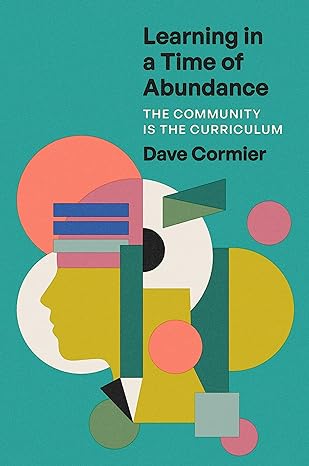'Learning in a Time of Abundance' (Chapter 5 & 6)
 The EdTechWeekly gang continues its discussion of Dave's new book, Learning in a Time of Abundance.
The EdTechWeekly gang continues its discussion of Dave's new book, Learning in a Time of Abundance.
This week: Chapter 5: Societal Implications & Chapter 6: Learning to Confront Uncertainty
We continue the conversation next week.
June 17, 2300 UTC (7pm EDT)
Global Times
Sections (as determined and not-so-accurately described by Zoom's AI)
Summary
The team discussed the societal implications of learning in a time of abundance, the addictive nature of social media, and the role of values in online communities. They also explored the complexities of balancing social outreach and profit motives in large-scale social media communities, and the drawbacks of evidence-based education. Lastly, they examined the impact of the COVID-19 pandemic on trust in authority, the potential role of splintered communities in spreading counter-programming, and the content of Dave's book.
Social Media, Sleep, and Self-Control Discussion
Jen, John, Jeff, and Dave discussed the addictive nature of social media and its impact on sleep patterns, self-control, and socialization. They agreed on the benefits of quiet time and boredom, which promote creative thinking and better socialization, and highlighted the challenges of constant connectivity, including micro-anxiety and the conversion of friendships into obligations. The group also shared their personal experiences with managing screen time and the pros and cons of the abundance of connections on social media platforms like LinkedIn and Twitter.
Social Media Strategies and Connection Challenges
Jen, John, and Jeff shared their strategies for curating connections and content on social media platforms. Jen stressed the importance of connections as a means for learning and shaping perspectives, while John discussed using different platforms for learning and sharing content. Jeff highlighted the layers of connections and the need to stay in touch with people who have impacted one's life. The group also discussed the challenges of maintaining connections across multiple platforms and the fragmentation caused by social media companies. Lastly, they talked about the evolution of LinkedIn and the potential of a new app, Noster, before concluding with some light-hearted banter about Dave's fish farming license.
Discussing Values and Beliefs in Communities
Jen, Dave, Jeff, and John discussed the role of values and beliefs in online communities. Dave emphasized the potential for radicalization within homogenous groups and the importance of overtly discussing and clarifying values. He also shared his experiences of cultural misunderstandings in Korea, highlighting the need for respecting and learning from differing cultural values. Jeff agreed, while John acknowledged the insights shared, reiterating the necessity for clear communication of values within communities.
Balancing Social Outreach and Profit Motives
The team discussed the complexities of balancing social outreach and profit motives in large-scale social media communities. They questioned the possibility of a 'benevolent dictator' in these organizations and debated the challenges faced by Wikipedia's unique success model. The conversation also touched upon the current pandemic, authority, and the perception of Dr. Fauci's efforts, as well as the increasing trend of problem-based problem solving approaches in the United States.
Evidence-Based Education and Real-Life Complexities
Dave highlighted the drawbacks of evidence-based education that emphasizes measurable results over other essential aspects of learning and development. He argued that preparing students only for certainty and a single answer, as exemplified in policies like No Child Left Behind, does not adequately prepare them for real-life complexities. Dave stressed the importance of engaging with uncertainty and multiple perspectives, promoting constructive dialogue in community conversations. Jen pondered on the potential origins of this rigid mindset, suggesting that an overabundance of information in society may be a contributing factor. She also noted that students might be surprised by a lack of definitive answers from authority figures.
COVID-19, Trust, and Nuanced Understanding
The team discussed the impact of the COVID-19 pandemic on trust in authority and the potential role of splintered communities in spreading counter-programming and fact-checking. Jen asked if there were any positives to the fragmentation of communities, to which Dave suggested that it could lead to a more nuanced understanding of issues. Dave also highlighted the importance of teaching nuance before facts to foster a more nuanced and empathetic understanding of different perspectives. The team also discussed the challenges of identifying trusted sources and the value of human intelligence in sifting through complex information.
Book Discussion and Future Plans
The group, including Dave, Jeff, John, and Jen, discussed the content and reception of Dave's book, with particular appreciation for the concluding sections. They also engaged in a light-hearted conversation about the size of the book and the ongoing debate between ebooks and hard copies. A follow-up meeting was scheduled for the next week to delve into the issues raised in the book, particularly the final chapter, "Practices for an Abundant World." Jeff also shared that his students were exploring these topics in their business proposals for the Lebo Foundation. Lastly, Dave mentioned his ongoing efforts to refine a presentation for a potential unplugged cafe, while Jen showed interest in understanding the differing perspectives between the business and education communities.
- Log in to post comments

